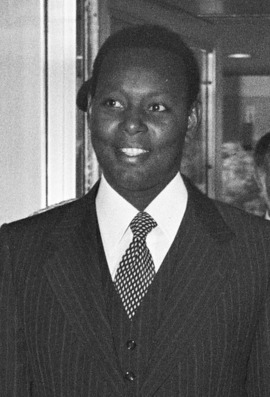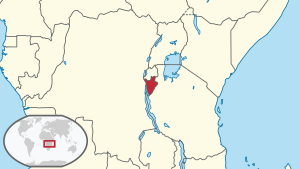Jean-Baptiste Bagaza facts for kids
Quick facts for kids
Jean Baptiste Bagaza
|
|
|---|---|

Bagaza in 1978
|
|
| 2nd President of Burundi | |
| In office 1 November 1976 – 3 September 1987 |
|
| Prime Minister | Édouard Nzambimana (1976–78), then position abolished |
| Preceded by | Michel Micombero |
| Succeeded by | Pierre Buyoya |
| Personal details | |
| Born | 29 August 1946 Rutovu, Ruanda-Urundi (modern-day Burundi) |
| Died | 4 May 2016 (aged 69) Brussels, Belgium |
| Political party | Union for National Progress (UPRONA) Party for National Recovery (PARENA) |
| Spouse | Fausta Bagaza |
| Military service | |
| Allegiance | |
| Conviction(s) | Conspiracy against former president Pierre Buyoya |
| Imprisoned at | Mpanga Prison (1997) |
Jean-Baptiste Bagaza (born August 29, 1946 – died May 4, 2016) was a Burundian army officer and politician. He led Burundi as its president and military ruler from November 1976 to September 1987.
Bagaza was born into the Tutsi ethnic group in 1946. He joined the Burundian military and rose through the ranks. In 1976, he took power in a peaceful military takeover, removing the previous president, Michel Micombero. Bagaza became the head of the ruling Union for National Progress (UPRONA) party. Even though he was involved in the difficult events of 1972, he brought in many changes that helped modernize the country. He also made some improvements for the Hutu ethnic group, who were the majority. After 1984, his government became stricter, especially towards the powerful Catholic Church. His rule ended in 1987 when he was overthrown by another military takeover and had to leave the country. He returned to Burundi in 1994 and became involved in politics again, leading the Party for National Recovery (PARENA). He passed away in 2016.
Contents
Biography
Early life and military career
Jean-Baptiste Bagaza was born in Rutovu, in what was then Ruanda-Urundi (now Burundi), on August 29, 1946. His family belonged to the Hima group, which is part of the larger Tutsi ethnic group. After attending Catholic schools in Bujumbura, he joined the army of the newly independent Kingdom of Burundi.
In 1966, he went to Belgium to study at the Royal Military Academy in Brussels. He finished his studies in 1971 and earned a degree in sociology. He came back to Burundi in 1972. Bagaza was involved in the difficult events of 1972, though how much he was involved is not fully clear. In May 1972, as a captain, he became the assistant chief of staff for logistics in the Burundian military. By November, he was promoted to lieutenant colonel and became the chief of the general staff.
Leading Burundi
Bagaza took control of Burundi in a military takeover on November 1, 1976. The country's rules were temporarily paused by a group of military leaders, who then named Bagaza president on November 10, 1976. He was 30 years old at the time.
After becoming president, Bagaza started several changes. He worked to reduce corruption and made some improvements for Hutus, who had faced challenges under the previous leader. He was known for his strong work ethic. Some Hutu people who had left the country during the 1972 events were allowed to return. Bagaza also gave a few government jobs to Hutus. In 1977, he ended the old land ownership system called Ubugererwa, which was a type of feudalism. Some land owned by Tutsis was given to Hutu farmers. However, Bagaza made sure that Tutsis still held most of the economic and political power.
He also started a plan to modernize Burundi's economy. This included building two new hydroelectric dams, which are still important for Burundi's energy today. He also built new roads, increased access to drinking water, and developed a port on Lake Tanganyika. These improvements helped Burundi's economy, which began to rely on exporting products like coffee, tea, and sugar. On the international stage, Bagaza managed to get financial help from many different countries around the world.

In 1981, Bagaza's government introduced a new national constitution. This constitution made Burundi a one-party state, meaning only one political party, the Union for National Progress (UPRONA), was allowed. Bagaza reorganized UPRONA and became its main leader. In the 1984 election, he was re-elected president with a very high percentage of the votes.
After this election, Bagaza began to act against the Catholic Church in Burundi. He saw the Church as a challenge to his power. His government became stricter, and foreign missionaries were asked to leave. He tried to reduce the Church's influence over the public and schools. Bagaza banned Catholic media and church services, closed Church-run learning centers, and ordered the arrest of some Church leaders. He also made some unusual rules, like limiting the hours bars could be open and how much time and money people could spend on traditional ceremonies. These policies made many Burundians unhappy.
Overthrown and later politics
In September 1987, while Bagaza was visiting Quebec, Canada, a military takeover happened. Major Pierre Buyoya led this takeover and successfully removed Bagaza from power, becoming the new president.
Bagaza went into exile, first in nearby Uganda and then in Libya. He lived there until 1993. He was against giving more power to Hutus after the 1993 elections. He was accused of playing a role in the attempted takeover against Melchior Ndadaye, who was Burundi's first democratically elected president. The people who tried to take over killed Ndadaye, but they failed to keep control. Power was then returned to a civilian, democratic government. Bagaza later said he was not involved in this attempt.
Despite the failed takeover, he returned to Burundi and started a new political party called the Party for National Recovery (PARENA). This party was known for having strong views, mainly representing Tutsi interests. As a former head of state, he became a senator for life. Bagaza was known for his extreme views, including being against any power-sharing agreements with Hutu groups. He even suggested dividing Burundi into separate areas for Tutsis and Hutus.
On January 18, 1997, Bagaza was placed under house arrest because he was accused of planning against President Buyoya. Two months later, he was briefly imprisoned but quickly released. Bagaza later took part in peace talks aimed at ending the Burundian Civil War. Because he and his party were often against power-sharing deals with Hutu rebel groups, the government placed Bagaza under house arrest again and banned PARENA from November 2002 to May 2003.
In 2005, there were rumors that some of Bagaza's followers were forming a rebel group. However, tensions eased when PARENA accepted positions in the new government. Bagaza ran as PARENA's candidate in the 2010 presidential election, but he withdrew when other opposition parties decided to boycott the elections. He stepped down as the head of PARENA in March 2014. Bagaza remained an important opposition leader in the Burundian Senate and joined the opposition boycott of the 2015 elections.
Jean-Baptiste Bagaza passed away in Brussels, Belgium, on May 4, 2016, at the age of 69. He was buried in Bujumbura on May 17, 2016. He was survived by his wife, Fausta, and their four daughters.
See also
 In Spanish: Jean-Baptiste Bagaza para niños
In Spanish: Jean-Baptiste Bagaza para niños
 | Calvin Brent |
 | Walter T. Bailey |
 | Martha Cassell Thompson |
 | Alberta Jeannette Cassell |

